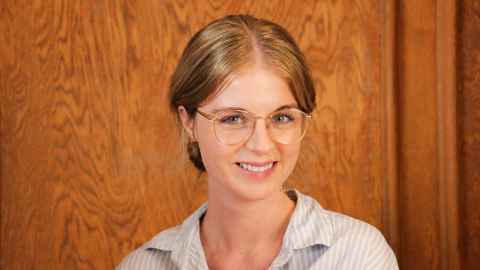Alex Casey: Why I became socially disconnected
18 May 2023
Opinion: Arts alumna Alex Casey has made a name for herself as a writer, TV host and podcaster. So why did she feel the need to log off social media?

When I was at the University of Auckland in 2010, I recall rolling my eyes at a hand-wringing article all about how the internet was going to pulverise our attention, wreck our curiosity and destroy our ability to ask questions. I can no longer remember the name of the paper, the person who wrote it, or anything specific about it, because the internet – specifically social media – has since pulverised my attention, wrecked my curiosity and destroyed my ability to ask questions.
Back then, Facebook was strictly a place to upload 47 terrible, blurry pictures of you and your friends on a night out and spend hours meticulously tagging everyone for no reason. Instagram barely existed and, if it did, you wouldn’t even be able to tell what you were looking at under the grainy sepia filter.
We didn’t know back then, in what still chillingly feels like extremely recent history, how these platforms would transmogrify into the oozing horror portals we know today.
Barely a day goes by now where there isn’t some horrible news emerging about the social media platforms that rule our lives. In my work as a journalist for The Spinoff, I have spoken to 16-year-old girls who are saving for breast implants as a direct result of following the Kardashians on Instagram, and I have started a TikTok account as a 13-year-old boy and seen just how long it took for the algorithm to serve me up extremist, sexist ideas (less than 60 seconds).

How would I watch the gender reveal for an unborn baby currently growing inside one of my distant acquaintances from primary school?
It is perhaps not a surprise, then, that more and more people are choosing to abandon these platforms altogether.
“I think that it is distorting human nature,” Eleanor Catton told The Guardian, five years after deleting her Twitter account.“It’s altering the way we think. It’s altering the way we exist in time.”
Ella Yelich O’Connor, aka Lorde, justified her online exodus bluntly: “I did it because I felt like my brain wasn’t working very well anymore.”
Two years ago, I quietly made my exit, too. Twitter was the first to go, a constant stream of anger and horror that had its claws in me so deeply that I found myself waking up every hour to check it through the night. Then went Instagram, a similarly relentless stream of inadequacy and anxiety. It was when I started giving up hours of my own weekend to lie on the couch and watch other people’s weekends through Instagram stories that I realised the rot had truly set in.
While reading Jia Tolentino’s Trick Mirror, I had another revelation about why it was all so exhausting. Referencing Erving Goffman’s theory of social engagement (something I do actually remember from 2010 – shout-out SOC101), she says social media has flattened the many facets of our lives into a never-ending show. “Online, your audience can hypothetically keep expanding forever, and the performance never has to end,” she writes.
In real life, we can shift between our different roles with ease, and crucially allow ourselves “backstage” time to be a grizzly grub where we don’t have to perform anything to anyone. But online, she argues, your audience is limitless and the show must go on. On social media, you are performing every ‘you’ to everyone, everywhere all at once: you as a colleague, you as a friend, you as a family member, you as a partner. No wonder we are all so tired.
It was when I started giving up hours of my own weekend to lie on the couch and watch other people’s weekends through Instagram stories that I realised the rot had truly set in.
For a long time, leaving social media felt like a type of death. How would people know what I was doing? How would I know what everyone else was doing? How would people be able to see my work? How would I watch the gender reveal for an unborn baby currently growing inside one of my distant acquaintances from primary school? It felt like pure hell, but being completely paralysed by information and images, outrage and aspiration, felt much, much worse.
I do still occasionally activate Facebook to ask something on the local community page. And despite it being one of the biggest, baddest social media platforms available, these interactions ironically feel much more productive than anything else out there. No misinformation, no influencers, no performance. Just a neighbour, desperately untagging 47 blurry photos of herself on a night out in 2010, and trying to get rid of some cardboard moving boxes.
Alex Casey is senior writer at The Spinoff and co-host of podcast The Real Pod. She has a BA in Media, Film and Television, and Sociology. In 2018, she became a University of Auckland 40 Under 40 awardee.
This article reflects the opinion of the author and is not necessarily that of Waipapa Taumata Rau, University of Auckland.
It first appeared in the Autumn 2023 edition of Ingenio magazine.
Read all Ingenio stories.